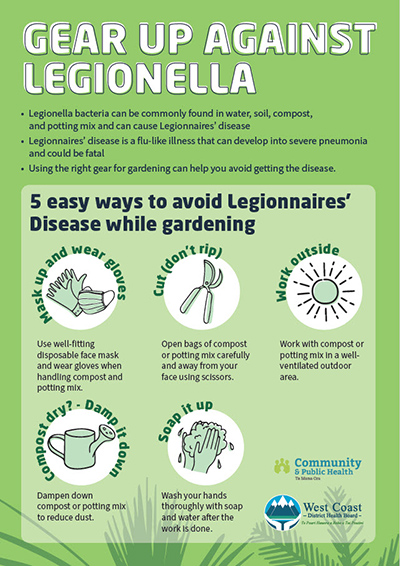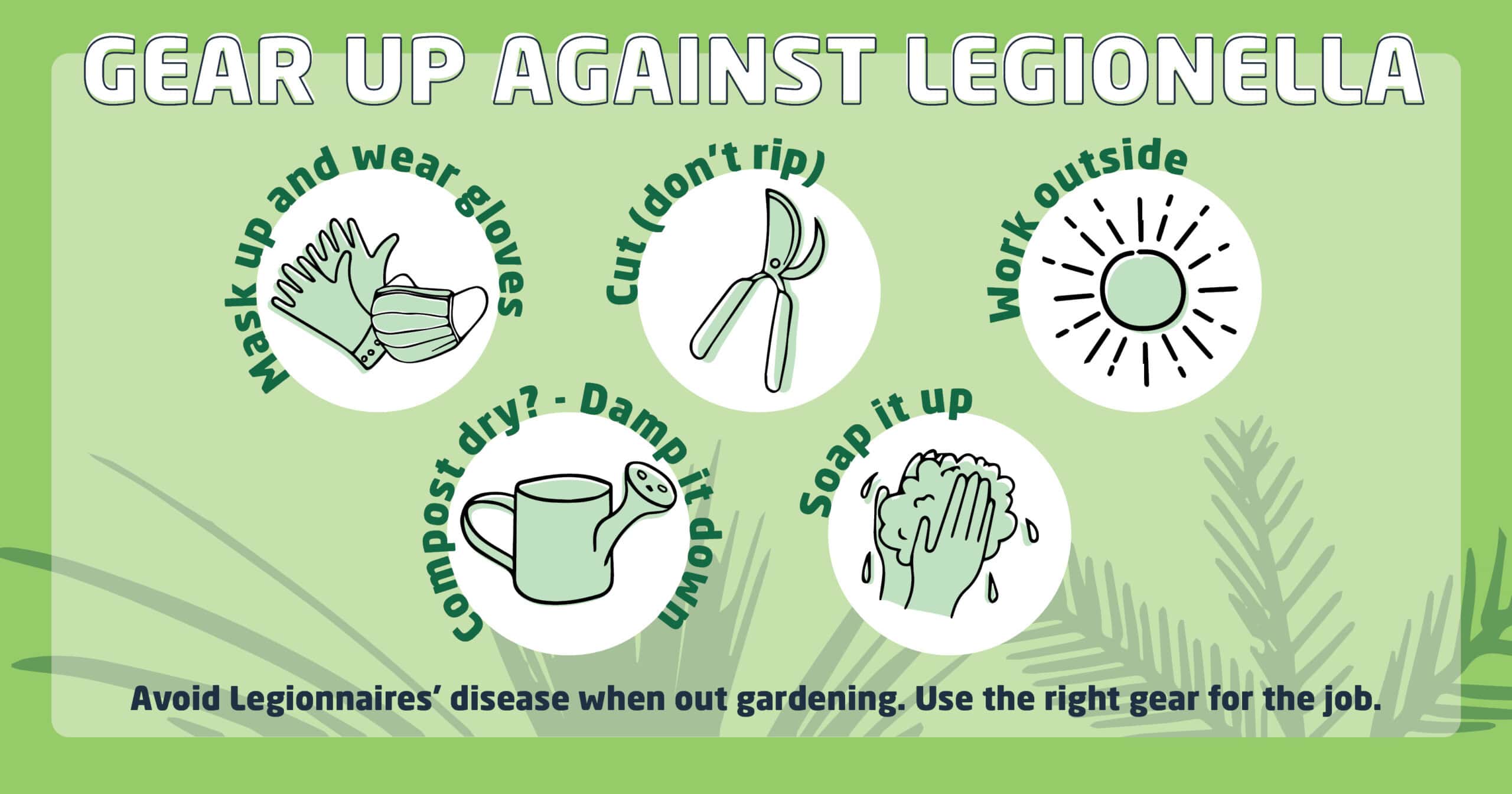
Cases of Legionnaires’ disease typically increase during the months of September, October and November during gardening season. Te Mana Ora – The Public Health Unit is urging everyone to ‘gear up’ to protect themselves against legionella bacteria that causes Legionnaires’ disease.
Legionella bacteria live mainly in water, soil and potting mix, and hot water cylinders.
If you are handling garden soil, compost or potting mixes, you need to be aware of the possible risk of getting Legionnaires’.
Public health advice is to gear up to avoid getting the disease. We are encouraging everyone to share the message, so we can prevent our whānau, family and friends from getting Legionnaires’ disease.
Gear up when handling compost, potting mix, and soil.
- Mask up and wear gloves
Use well-fitting disposable face mask and wear gloves when handling compost and potting mix.
- Cut (don’t rip)
Open bags of compost or potting mix carefully and away from your face using scissors.
- Work outside
Work with compost or potting mix in a well-ventilated outdoor area.
- Compost dry? Damp it down
Dampen down compost or potting mix to reduce dust.
- Soap it up
Wash your hands thoroughly with soap and water after the work is done.
Download our campaign poster
Gear Up Against Legionella A4 Poster (PDF, 241 KB)

Gear up against legionella
Share this on social media
Gear Up Against Legionella Facebook Tile (JPG, 144 KB)

FAQs
What are the symptoms to look out for?
The symptoms can appear ‘flu-like’ from a mild infection known as Pontiac fever to a serious form of pneumonia called Legionnaires’ disease.
Mild infection (Pontiac fever)
Pontiac fever is a mild infection that has symptoms similar to the flu, such as muscle aches and fever. You don't get pneumonia. Symptoms begin between a few hours to 3 days after being exposed to the Legionella bacteria.
Serious infection (Legionnaires’ disease)
Legionnaires’ disease is a type of severe pneumonia (lung infection) that is caused by the Legionella bacteria. It can cause serious illness and can be fatal. The signs and symptoms of Legionnaires’ disease are similar to that of a lung infection (pneumonia). It can also sometimes cause infection outside your lungs.
The early signs may include muscle aches, cough, tiredness, headache and loss of appetite.
This is followed by fever and chills.
Sometimes nausea, vomiting and diarrhoea (runny poos) may occur and you may become confused.
Symptoms usually begin 2–10 days after being exposed to the bacteria. It can take longer, so watch for symptoms for about 2 weeks after exposure.
You are likely to get quite sick and need hospital treatment.
What should I do if I think I have Legionnaires’?
If you have signs of Legionnaire’s disease, see your doctor immediately. Your doctor may arrange for you to have a blood test, sputum test, urine test or a chest x-ray. Chest x-rays will show whether you have pneumonia. The other tests will help to confirm whether it is due to the Legionella bacteria.
How is Legionnaires’ treated?
People with mild infection (Pontiac fever) don't usually need treatment and recover within 2–5 days.
People with Legionnaires’ disease require treatment with antibiotics. It is important to be diagnosed and treated quickly. Early treatment can stop the disease from becoming severe. Because this can cause serious illness, go back to your doctor or to hospital if your symptoms are getting worse.
Because there are many different strains of Legionella bacteria, having had legionellosis does not protect you from infection and you can develop legionellosis again if exposed to the bacteria.
Because it is not spread from person to person, you can return to work whenever you feel well enough. There is no risk of infecting other people.
How can I minimise the risk of getting Legionnaires’?
Gear up when handling compost, potting mix, and soil.
- Mask up and wear gloves
Use well-fitting disposable face mask and wear gloves when handling compost and potting mix.
- Cut (don’t rip)
Open bags of compost or potting mix carefully and away from your face using scissors.
- Work outside
Work with compost or potting mix in a well-ventilated outdoor area.
- Compost dry? Damp it down
Dampen down compost or potting mix to reduce dust.
- Soap it up
Wash your hands thoroughly with soap and water after the work is done.
Tags gardening seasoninfectionlegionellalegionnaires' disease



